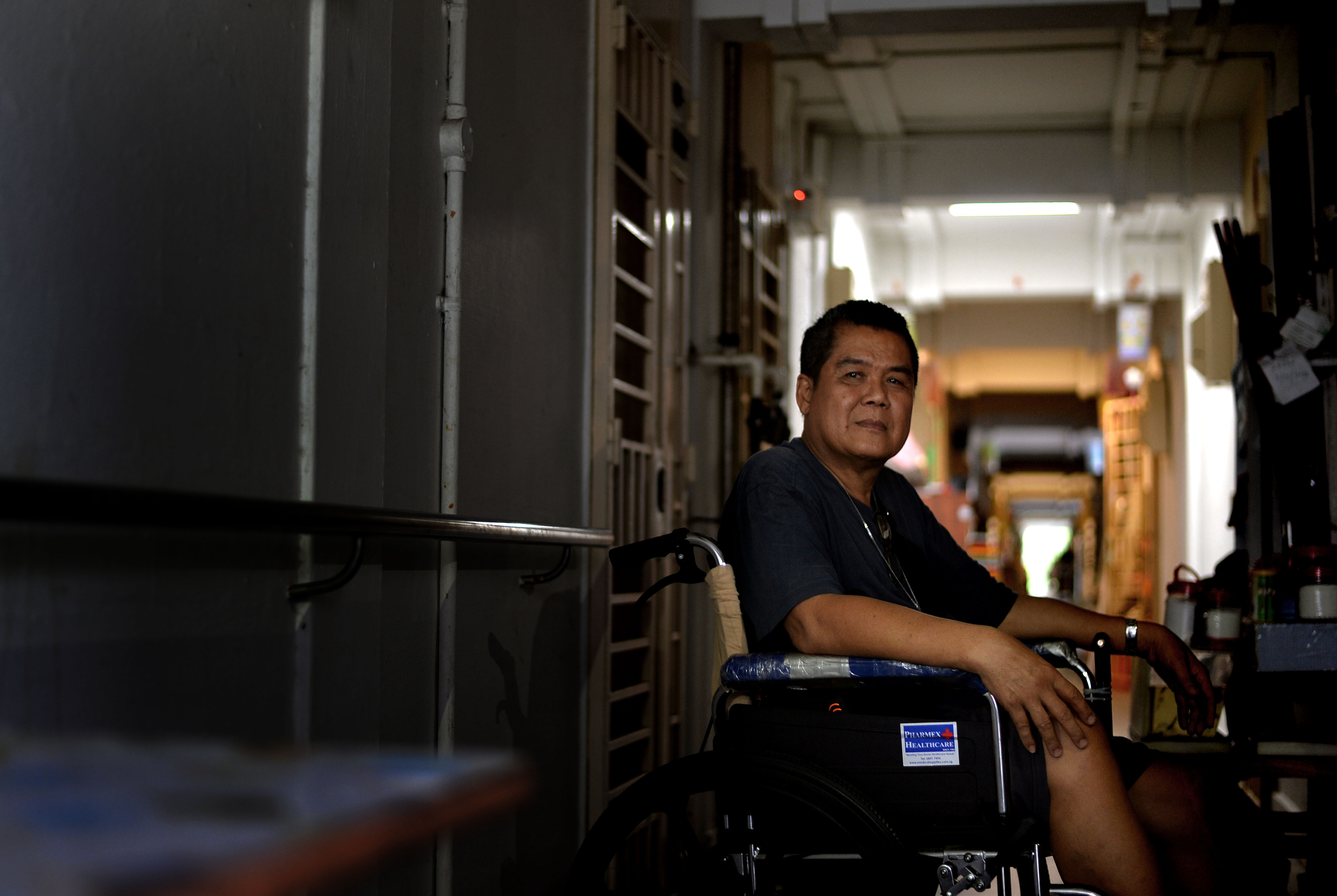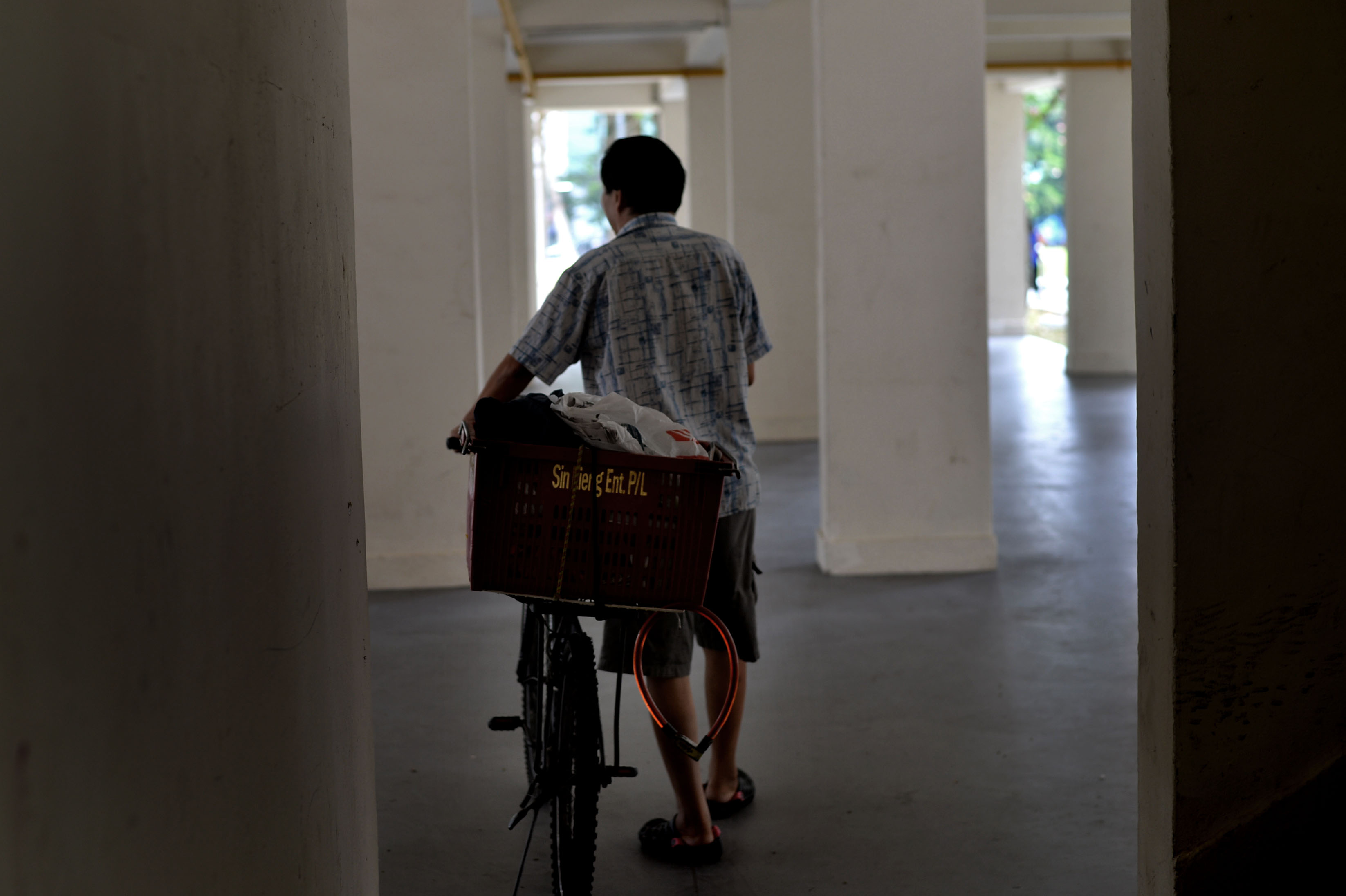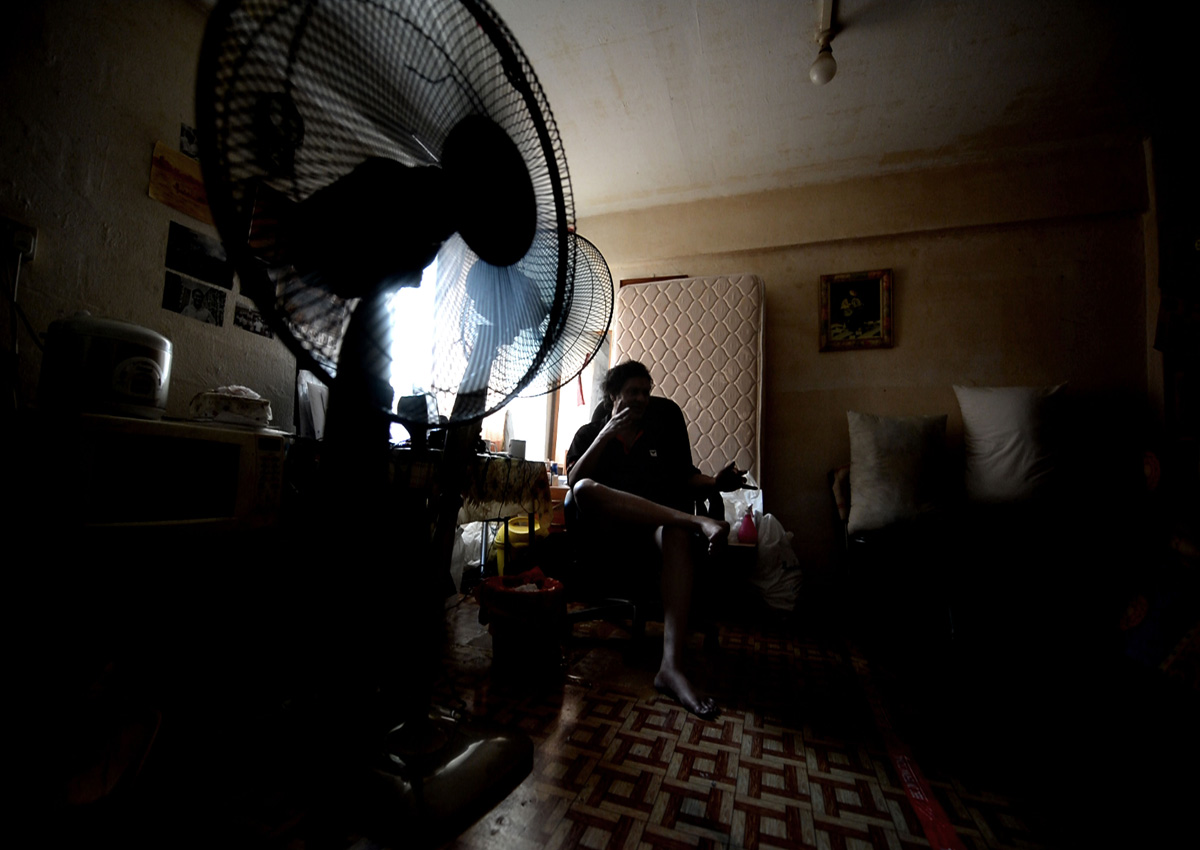Nicholas wants to shield his extended family from the shame of him being poor in Singapore.
He wants a fictitious name used and pictures that do not show his face.
The former freelance tutor, 51, tells The New Paper on Sunday: “I have siblings, nephews and nieces here, and I don’t want to shame them.”
Nicholas did not start out poor.
He had a job that paid $2,500 a month and was a strapping man until he took ill suddenly in 2008.
“My potassium level had fallen really low a couple of times that year, and I had to be warded and given potassium chloride from a drip.
“The pain was excruciating,” he recalls.
It was then that Nicholas was diagnosed with diabetes, a condition that had gone undetected for two years.
By the time it was discovered, he had already suffered nerve damage.
The chronic disease that cost him his sense of touch also took away his confidence to teach and face the world.
“No one would give me, a sick man, a job. My self-confidence and emotions took a tumble,” he says.
“The condition got worse and I lost the use of my left hand. I’ve no feeling in my hands – I can’t retrieve coins from my trouser pockets because I can’t feel them.”
Getting up from a chair or the toilet seat is a long-drawn-out process.
STRUGGLE
“It takes me 10 to 20 minutes every morning when I go to the toilet because I struggle to get up. The pain I encounter every day cripples me, both physically and mentally,” Nicholas says.
He could not work because of his condition, and it took a toll on his mental well-being. He is also now no longer on speaking terms with his family. Without support, Nicholas became depressed.
“I tried applying for a rental flat, and the Housing Board officer advised me to approach the CDC (Community Development Council).
“I guess I ticked all the boxes because I got on Public Assistance without any hitches,” he says.
Nicholas says that out of the $450 he receives a month, he has a little more than $200 left after paying all his bills.
“It is still a struggle. I’ve to make sure I spend only between $7 and $8 a day to survive,” he says.
“Every morning, Willing Hearts delivers food packs. I usually have that for lunch – sometimes for both lunch and dinner. I add water to make the food into porridge for dinner,” he adds.
Willing Hearts operates a soup kitchen that cooks and distributes about 4,500 meals to the needy every day.
Fully run by volunteers, its beneficiaries include the elderly, people with disabilities, low-income families, children from single-parent families as well as migrant workers here.
Nicholas says his Medisave ran out in 2013 and he now depends on help from both Changi General Hospital and the CDC for his medical expenses.
Every day is a struggle for Nicholas.
When asked what he fears most, he says: “Tomorrow.”
Robin Hood of North Bridge Road

Photo: The New Paper
Mr Willie Yeo, 65, is wheelchair-bound and needs financial and medical help.
But his poor elderly neighbours are his priority.
“Whenever my friends, who remember me, take me out for a scrumptious meal at a grand restaurant, I would tar pau (pack in Hokkien) food back for my neighbours,” he says.
It is no wonder that he earned the nickname “Robin Hood” among his neighbours at the rental flats in North Bridge Road.
Mr Yeo, a divorcee who lives alone, says he lost his job because of his many health problems.
“The bank foreclosed my flat in Yishun, and I was forced to sell it. I made only $15,000 from the sale, which went to paying back money I had borrowed,” he says.
“I used to be a roving salesman more than 10 years ago, selling beads for making jewellery.
ILLNESSES
“I would lug between 20 and 30kg of beads from one place to another and travelling only by public transport,” he says.
He believes that was the cause of his degenerative wear and tear of his right ankle, which resulted in metal pieces being attached to his right foot.
Mr Yeo has a litany of other problems.
“I have diabetes and hypertension, and I suffer from fatty liver. I also have asthma and testicular cancer.
“I recently underwent radiation treatment for prostate cancer. I go to Tan Tock Seng Hospital for a check-up twice a month. That’s why the nurses all know me well,” he says with a chuckle.
He is also recovering from a fractured right shoulder – believed to be due to osteoporosis – and suffers from pain in his knees.
While his medication is covered by Medifund and the hospital’s endowment fund, Mr Yeo is no longer on Public Assistance since he started collecting his Central Provident Fund in 2013 after he turned 62.
“So I withdraw $540 each month, and I sell tissue paper to earn another $300 to supplement my income,” he says.
Some people have rebuked him for selling tissue paper and that has depressed Mr Yeo.
“I hope people understand that we didn’t ask to be sick and to be thrown suddenly into poverty.
“Who doesn’t want to be healthy and earn a proper living?
“Perhaps that’s why I throw myself into helping my neighbours out. I feel happy when I see them happy,” he says.
He hopes to become healthy again

Photo: The New Paper
He was once a cook – and a good one too, he says.
Then the 54-year-old, who wants to be known only as Mr Lee, suffered a heart attack and stroke six years ago.
He says he lost his job, his family and a roof over his head.
The bachelor was living with his mother in her flat in the east of Singapore, but he felt like a burden as he was jobless and sick, so he left.
“I felt that I was a disappointment to her. If I were not living there, it would be out of sight, out of mind,” he says, tears welling in his eyes.
Homeless for the last three years, Mr Lee has been sleeping in parks and sometimes at an uncle’s place.
“He recently suffered from a stroke, so by staying over, I can help to keep an eye on things,” he adds.
Mr Lee gets his meals from charity Willing Hearts, which runs a soup kitchen.
PHYSIOTHERAPY
“Previously I went to a Chinese temple in Geylang for vegetarian food. Many homeless people I’ve met take their meals there.
“But I developed gout and have to stay away from bean-based food, so I stopped going to the temple,” he says.
For his daily hygiene, Mr Lee says he goes to a public pool for his showers.
“I don’t go in free of charge. I use the voucher given out by the Government for SG50. I also swim once in a while as a form of physiotherapy.
“I am hoping to get back my health so that I will be able to look for a job,” he says.
He told The New Paper on Sunday that his Public Assistance fund of $400 a month “will dry up by the end of the month”.
“I can’t simply wait around for handout,” he says.
He was advised to claim insurance as he suffered his heart attack while still working, “but I don’t want to, because that would mean if I win, then I cannot seek help from any government agencies any longer”.
He does not have a clue how much money he can claim from his insurance.
Mr Lee hopes to return to cooking for a hawker stall, even though the stress may be too much for his heart to take.
“I am working on getting healthy because that is the only skill I know, but I am worried no one will hire a sick man,” he says.
“Then again, tomorrow is another day,” he adds in a chirpy voice before riding off on his bicycle, with his worldly possession contained in the basket behind him.
About the study
To design solutions for the poor and get low-income Singaporeans to help lead the study, the researchers formed an advisory committee made up of 10 men and women from low-income communities.
The Centre for Culture-Centred Approach to Research and Evaluation then launched an online campaign to raise awareness on poverty here.
Research assistant Naomi Tan says: “This is where we argue that the community members, in this case the low-income, are in the best position to identify and define the problems they face and the corresponding solutions that would actually be impactful and relevant to them.”
What does it mean to be poor
The study found:
Low-income Singaporeans either live in interim or public rental housing. Some are homeless.
They have a monthly household income of $1,500 or less. Some are on Public Assistance, which ranges from $450 to $1,180 each month and has a set of eligibility criteria.
They are unable to afford healthcare as they do not have enough savings or do not earn enough.
Some of the elderly, despite having children, are struggling to get by.
They suffer from food insecurity, so they eat cheap but non-nutritious food.
They cut down on the number of hot meals a day, worry if there is enough food in the house and are choosing to not spend their limited cash on healthier foods
Challenges faced by the poor
Although the resources to help are available, the poor do not know how to get information on what they are eligible for or how to get to the relevant agencies.
Another significant hurdle is the submission of an application that is according to the requirements set out by the agencies.
Many from the low-income group find the stringent conditions tedious and frustrating.
Stigma and alienation from relatives and the community at large hinder the poor from seeking the help needed.
The Government has set up safety nets, such as Medifund, for low-income individuals who face health problems.
Despite these efforts, they still cannot afford healthcare due to insufficient savings or a low wage.

This article was first published on April 24, 2016.
Get The New Paper for more stories.






